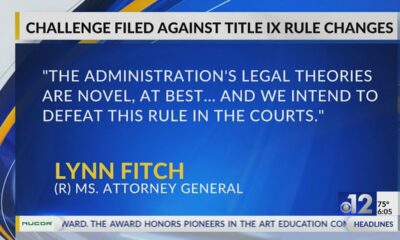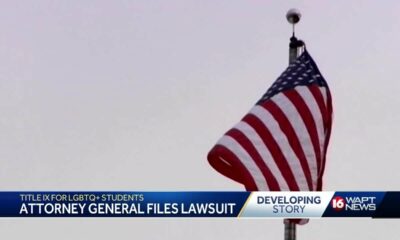Mississippi News
In Mississippi, Christian forgiveness does not equate to felony voting reforms
In Mississippi, Christian forgiveness does not equate to felony voting reforms
As Haley Barbour faced an onslaught of criticism for pardoning dozens of people convicted of felonies as his tenure as governor ended in 2012, he cited his Christian beliefs for his actions.
“Christianity teaches us forgiveness and second chances. I believe in second chances, and I try hard to be forgiving,” the former governor said soon after leaving office of the more than 200 acts of clemency he granted.
During his eight years as governor, Barbour, like most other Mississippi politicians, did nothing to make that forgiveness more inclusive by creating a system that would make it easier for the literally tens of thousands of people convicted of felonies to have their voting rights restored.
Most Mississippi politicians wear their Christianity on their sleeve. The primary tenet of the Christian faith is forgiveness and redemption. Yet, they do not see as part of that forgiveness and redemption the restoration of voting rights for people convicted of felonies.
Multiple studies have made the argument that restoring voting rights increases the odds that people who have been convicted of felonies will become productive members of society.
Dennis Hopkins, a 46-year-old Potts Camp resident who lost his right to vote as a teenager when he was convicted of grand larceny, but is now a productive member of the community in the north Mississippi hamlet, explained to lawmakers the importance of voting.
“Voting to me is everything,” Hopkins said in 2021 during a legislative hearing. “I tell my kids how important the vote is … it shames me to tell them I can't vote.”
The old adage that the judicial system moves slowly has never been truer than when it comes to Mississippi's one-in-the-nation system of preventing people convicted of certain felonies from regaining their voting rights.
On Sept. 25, 2021 (more than 10 months ago), the entire panel of the 5th Circuit Court of Appeals heard arguments about whether Mississippi's felony disenfranchisement is unconstitutional. Seventeen judges heard the argument at the federal courthouse in New Orleans. It is not an everyday occurrence for the entire panel to hear oral arguments, so the assumption was that the federal appeals court was placing a priority on the issue.
But since that September day, there have been crickets from the court.
At some point, the court finally will issue a ruling.
In Mississippi, people with felony convictions must petition the Legislature to get a bill passed by a two-thirds majority of both chambers to regain voting rights. Normally only a handful (less than five) of such bills are successful each session. There is also the option of the governor granting a pardon to restore voting rights. But no governor has granted pardons since Barbour in 2012.
For a subset of those who lose their rights, the courts can expunge their record. In some instances that expungement includes the restoration of voting rights and for others it does not. It just depends on the preference of the judge granting the expungement.
During the 2022 session, legislation was passed clarifying that the judicial expungement would always include the restoration of voting rights. That modest legislation would have been the biggest change to the state's felony voting system since it was incorporated into the Mississippi Constitution in 1890. But it was vetoed by Gov. Tate Reeves.
The U.S. Supreme Court in past decisions has given the states broad leeway in stripping the right to vote for those convicted of felonies. But it is worth pointing out that Mississippi is in a distinct minority of states (less than 10) not automatically restoring voting rights at some point after a sentence is completed.
The aforementioned 5th Circuit is considering the argument that the Mississippi felony voting ban is unconstitutional because it was placed in the 1890 state Constitution as one of many provisions intended to prevent African Americans from voting. If it was done for racial reasons, then it should be unconstitutional, the proponents of the lawsuit argue. Mississippi Attorney General Lynn Fitch opposes the lawsuit.
In the 1890s, the Mississippi Supreme Court wrote the disfranchisement of people of specific felonies was placed in the Constitution “to obstruct the exercise of the franchise by the negro race” by targeting “the offenses to which its weaker members were prone.” The crimes selected by lawmakers to go into the provision were thought by the white political leaders at the time as more likely to be committed by African Americans. They also imposed poll taxes, literacy tests, segregated schools, a ban of mixed race marriages and other racist provisions into the Constitution.
They, of course, took all of those steps in the name of Christianity.
This article first appeared on Mississippi Today and is republished here under a Creative Commons license.
Mississippi News
Mississippi sees high number of job openings
SUMMARY: Mississippi's economy is thriving with many job openings, but not enough people to fill them. Occupations in high demand include registered nurses, fast food workers, retail sales, general managers, first-line supervisors, and physicians. The state has a low unemployment rate, with jobs available in various sectors including healthcare, manufacturing, education, retail, transportation, and public administration. The mass exodus of Baby Boomers, early retirements, and the impact of the coronavirus pandemic have contributed to the mismatch between job openings and applicants. Experts note a shortage of workers in the hospitality industry and believe that many who left the job market are now returning.
The post Mississippi sees high number of job openings appeared first on www.wjtv.com
Mississippi News
CPD sends message to parents with Operation T-B.O.N.E.
SUMMARY: The Columbus Police Department is cracking down on crime with Operation T-B.O.N.E, targeting neighborhoods to reduce violence. The recent arrest of two brothers for possession of stolen firearms and drugs prompted the involvement of their mother in the investigation. Chief Joseph Daughtry emphasized the importance of community involvement, urging people to provide tips and information to help combat crime. The CPD is increasing patrols in high-crime areas and making more traffic stops, aiming to make it uncomfortable for criminals. The slogan “Tippin' ain't snitchin'” underscores the importance of reporting criminal activity without fear of retaliation.
The post CPD sends message to parents with Operation T-B.O.N.E. appeared first on www.wcbi.com
Mississippi News
MSU students research legacy of Starkville’s first black physician
SUMMARY: Dr. Douglas Conner, a prominent figure in Starkville, Mississippi, was known for providing healthcare and advocating for the African American community during a time of discrimination. He led economic boycotts, organized marches, and worked with the NAACP to fight for the rights of black people. His legacy was honored by the community, with a research project and event led by Mississippi State University students. Conner's daughter expressed pride in her father's recognition, emphasizing the importance of his fight continuing to inspire younger generations. The event included a tour of black history locations in downtown Starkville, highlighting the impact of Conner's work.
The post MSU students research legacy of Starkville's first black physician appeared first on www.wcbi.com
-
SuperTalk FM6 days ago
Driver’s education set to become mandatory in Mississippi as bill passes
-
SuperTalk FM4 days ago
State approves $160M to expand Highway 7 to four lanes in Lafayette County
-
SuperTalk FM1 day ago
Legislation outlawing ‘squatted’ vehicles in Mississippi signed into law
-
Mississippi Business7 days ago
Geartek expanding operations in Alcorn County
-
Mississippi News2 days ago
LCSO wants people aware of a scam circling the area
-
Mississippi Today3 days ago
On this day in 1917
-
Mississippi News6 days ago
Altercation at Mississippi police department leads to officer-involved shooting
-
Mississippi News2 days ago
Winston Co. Sheriff’s Office investigates shooting at Dave’s Club











































